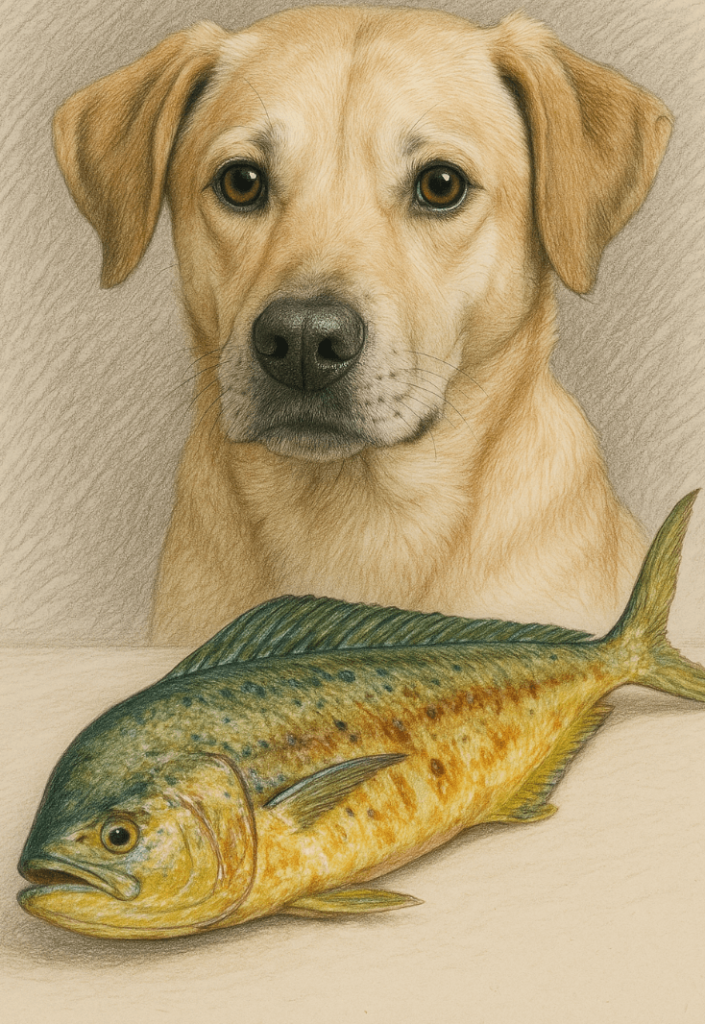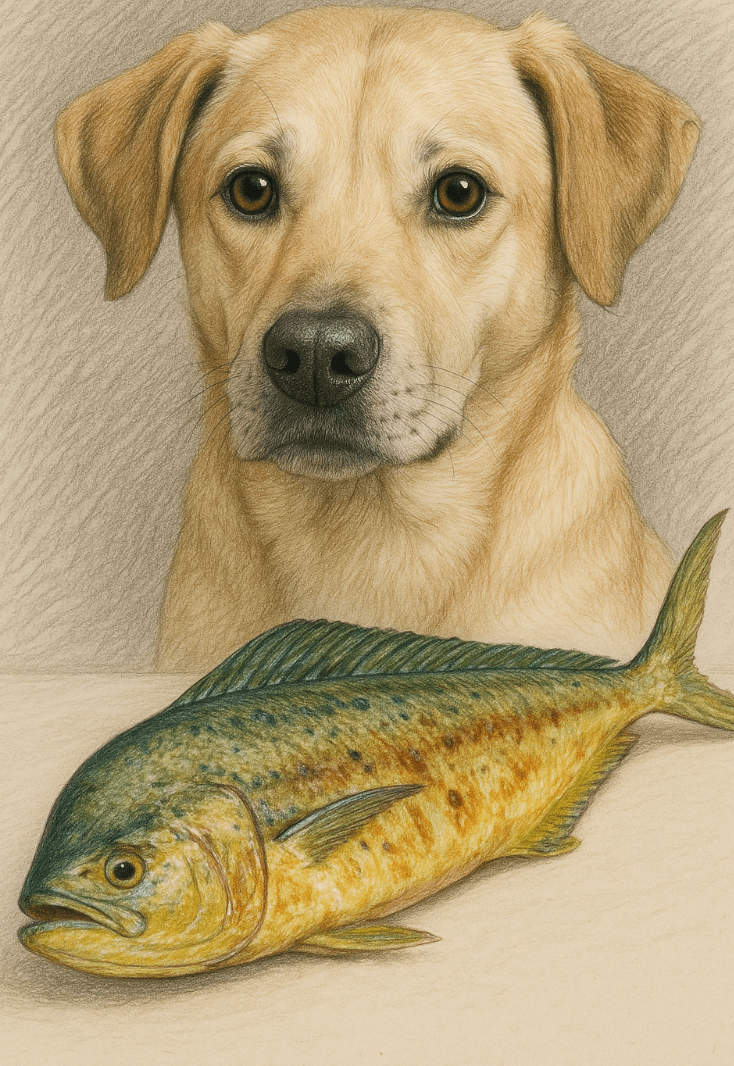Can Dogs Eat Mahi Mahi? A Guide to Safe Feeding
When it comes to expanding your dog’s diet, many pet owners wonder whether certain human foods are safe for their furry companions. One such food is mahi mahi, a popular fish known for its mild flavor and nutritional benefits. But can dogs eat mahi mahi? The short answer is yes—when prepared correctly, mahi mahi can be a healthy addition to your dog’s diet. However, there are important considerations to keep in mind to ensure your dog’s safety and well-being. In this blog post, we’ll explore the benefits of feeding mahi mahi to dogs, potential risks, and tips for serving it safely. Whether you’re looking to introduce new proteins or simply curious about this lean fish, we’ve got you covered.
Benefits of Feeding Mahi Mahi to Dogs
Mahi mahi offers several health benefits that make it a nutritious choice for dogs when served appropriately. Here’s why this fish can be a great addition to their diet.
High-Quality Protein:
Mahi mahi is rich in protein, which supports muscle development, energy levels, and overall growth in dogs.Low in Fat:
This lean fish is low in unhealthy fats, making it an excellent option for dogs needing weight management.Rich in Omega-3 Fatty Acids:
Omega-3s promote healthy skin, a shiny coat, and reduced inflammation, benefiting dogs with allergies or joint issues.Packed with Essential Vitamins:
Mahi mahi contains vitamins like B12 and niacin, which support brain function, metabolism, and immune health.Low Risk of Mercury Contamination:
Compared to larger fish like tuna, mahi mahi has lower mercury levels, making it safer for occasional consumption.
By incorporating mahi mahi into your dog’s diet responsibly, you can provide them with valuable nutrients while avoiding common dietary pitfalls.
Potential Risks of Feeding Mahi Mahi to Dogs
While mahi mahi can be a healthy treat, there are risks to consider before offering it to your dog. Awareness of these hazards ensures a safe feeding experience.
Bones and Choking Hazards:
Small bones in fish can pose choking risks or cause internal injuries if swallowed. Always remove all bones before serving.Seasonings and Additives:
Spices, oils, and sauces often used in cooking mahi mahi can upset a dog’s stomach or even be toxic. Serve it plain and unseasoned.Allergic Reactions:
Some dogs may be allergic to fish; watch for symptoms like itching, vomiting, or diarrhea after feeding.Overfeeding Concerns:
Too much fish can lead to an imbalance in nutrients, particularly if it replaces other essential proteins in their diet.Parasites or Bacteria:
Raw or undercooked mahi mahi may contain harmful parasites or bacteria. Always cook the fish thoroughly before serving.
Understanding these risks allows you to make informed decisions and prioritize your dog’s health.
Check this guide 👉Can Dogs Eat Oxtail Bones? Best 7 Expert Tips!
Check this guide 👉Can Dogs Eat Farro? Best 7 Expert Tips!
Check this guide 👉Can Dogs Eat Truffles? Best 7 Expert Tips!

Safe Preparation Tips for Mahi Mahi | Risks to Avoid When Feeding Mahi Mahi |
|---|---|
Cook the fish thoroughly without oil | Avoid seasoning with salt, garlic, or spices |
Remove all bones before serving | Do not feed raw or undercooked fish |
Serve in small, bite-sized portions | Limit frequency to prevent nutrient imbalances |
Offer as a treat, not a meal replacement | Watch for signs of allergies or digestive upset |
Use fresh, high-quality fish | Avoid processed or pre-packaged fish products |
How to Safely Introduce Mahi Mahi to Your Dog
Introducing new foods to your dog’s diet requires care and attention. Follow these steps to ensure a smooth transition when offering mahi mahi.
Start with Small Portions:
Begin with a small piece of cooked mahi mahi to monitor your dog’s reaction and digestion.Check for Allergies:
Observe your dog for any signs of allergies, such as itching, swelling, or gastrointestinal issues, after feeding.Cook Plain and Simple:
Bake, steam, or grill the fish without adding oils, seasonings, or sauces to keep it safe and healthy.Serve as an Occasional Treat:
Limit mahi mahi to occasional treats rather than a staple food to maintain a balanced diet.Consult Your Veterinarian:
If unsure, seek advice from your vet to confirm that mahi mahi suits your dog’s specific dietary needs.
By following these guidelines, you can safely incorporate mahi mahi into your dog’s diet without compromising their health.
Signs Your Dog May Not Tolerate Mahi Mahi
Not all dogs react well to new foods, including mahi mahi. Recognizing warning signs early helps prevent discomfort or complications.
Vomiting or Diarrhea:
These symptoms indicate digestive upset, suggesting your dog may not tolerate the fish well.Excessive Itching or Scratching:
Persistent scratching could signal an allergic reaction to the fish protein.Swelling or Hives:
Facial swelling or hives are serious signs of an allergic response requiring immediate veterinary attention.Lethargy or Loss of Appetite:
A sudden lack of energy or refusal to eat may indicate an adverse reaction to the food.Difficulty Breathing:
In rare cases, severe allergies can cause respiratory distress—a medical emergency requiring urgent care.
Being vigilant about these signs ensures your dog’s safety when trying new foods.
Common Mistakes to Avoid When Feeding Mahi Mahi
Even well-intentioned pet owners can make mistakes when introducing mahi mahi to their dog’s diet. Avoiding these errors ensures a safe and positive experience.
Feeding Raw Fish:
Raw mahi mahi can harbor harmful bacteria or parasites, posing health risks to your dog.Adding Harmful Seasonings:
Salt, garlic, and spices commonly used in human recipes can irritate your dog’s digestive system.Overfeeding Fish:
Too much mahi mahi can disrupt the balance of nutrients in your dog’s diet, leading to deficiencies.Ignoring Portion Sizes:
Large pieces of fish can be difficult for dogs to chew and swallow, increasing the risk of choking.Skipping Veterinary Advice:
Consulting your vet before introducing new foods ensures they align with your dog’s unique dietary needs.
Avoiding these mistakes ensures your dog enjoys mahi mahi safely and healthily.
Alternative Fish Options for Dogs
If mahi mahi isn’t available or suitable for your dog, there are other fish options that offer similar benefits.
Salmon (Cooked):
Rich in omega-3 fatty acids, salmon supports skin health and reduces inflammation—but avoid smoked or seasoned varieties.Cod:
Low in fat and calories, cod is another lean fish that’s easy to digest and packed with protein.Sardines (Boneless):
Small and nutrient-dense, sardines provide calcium and omega-3s but should be served in moderation due to their sodium content.Tilapia:
Mild in flavor and low in mercury, tilapia is a safe and affordable fish option for dogs.Whitefish (Cooked):
Varieties like haddock or pollock are lean, low-mercury choices that are gentle on your dog’s stomach.
These alternatives allow you to diversify your dog’s diet while providing essential nutrients.
Tips for Incorporating Fish into a Balanced Diet
Incorporating fish like mahi mahi into your dog’s diet requires balancing it with other essential nutrients. Follow these tips for optimal results.
Combine with Vegetables:
Pair fish with dog-safe veggies like carrots or green beans to add fiber and vitamins to their meal.Include Other Proteins:
Rotate fish with other lean proteins like chicken, turkey, or beef to ensure a variety of nutrients.Limit Treat Portions:
Keep fish-based treats to no more than 10% of your dog’s daily caloric intake to maintain balance.Monitor Weight Changes:
Regularly check your dog’s weight to ensure fish isn’t contributing to unwanted weight gain or loss.Adjust Based on Age and Activity Level:
Puppies, seniors, and highly active dogs have different nutritional needs; tailor their diet accordingly.
These strategies help you create a balanced and nutritious diet that incorporates fish safely and effectively.
Frequently Asked Questions About Feeding Mahi Mahi to Dogs
Can I feed my dog raw mahi mahi?
No, raw fish may contain harmful bacteria or parasites. Always cook mahi mahi thoroughly before serving.
How often can I give my dog mahi mahi?
Limit it to once or twice a week as an occasional treat, not a daily food item.
Is mahi mahi better than other fish for dogs?
Yes, its low mercury content and high omega-3 levels make it a safer and healthier option compared to larger fish like tuna.
What should I do if my dog eats a bone from mahi mahi?
Monitor your dog closely for signs of choking or discomfort, and contact your vet if you notice any issues.
Can puppies eat mahi mahi?
Yes, but in very small amounts and only after consulting your veterinarian to ensure it’s appropriate for their age.
Making Mahi Mahi a Safe and Healthy Treat for Your Dog
Feeding mahi mahi to your dog can be a nutritious and enjoyable way to diversify their diet, provided it’s done safely and responsibly. By understanding the benefits, risks, and proper preparation methods, you can ensure your dog enjoys this lean fish without any adverse effects. Always prioritize moderation, quality, and veterinary guidance when introducing new foods. With careful planning, mahi mahi can become a tasty and healthful addition to your dog’s menu, supporting their overall well-being and happiness.
Do Cats Have Taste Buds? Best 7 Expert Tips! – Discover how cats experience flavors and why their taste is so unique.
Do Dogs Have Taste Buds? Best 7 Expert Tips! – Discover how dogs experience taste, their preferences, and what it means for their diet and health.
Can Cats Taste Sweet? Best 7 Expert Tips! – Discover why cats can’t taste sweetness, how it affects their diet, and tips to keep them healthy and happy.
Can Dogs Taste Sweet? Best 7 Expert Tips! – Discover how dogs perceive sweetness, which foods are safe, and tips to manage their sweet cravings responsibly.





